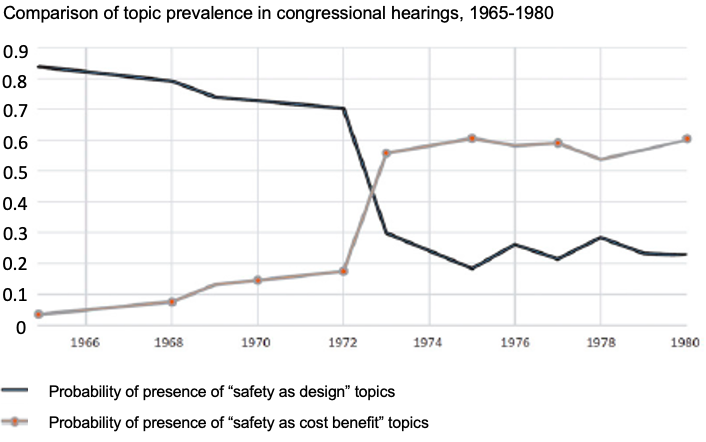
IESE Insight
Is now the time? Recognizing tipping points in societal culture
We've known about climate change since the 1980s, but we're only really putting pressure on fossil fuel companies now. Why? Massimo Maoret talks about the role societal culture plays in regulation and opportunity.
- To develop sound business strategy, it's important to understand the prevailing beliefs and values of a society, as well as the legal context.
- The legal environment can change even without a change in the law: A law can be fundamentally "good," but if it isn't culturally consonant, it will be harder to enforce.
- There are computer tools to analyze how prevalent topics and ideas are changing and to predict cultural trends.
Professor Massimo Maoret sat down to talk to IESE Insight about a recent article he co-wrote with Simona Giorgi and Edward J. Zajac that considers how public sentiment, beliefs and values affect companies, especially in terms of the enforcement of regulations, and why industry needs to keep its finger on the pulse of societal culture.
IESE Insight: You are a professor of strategic management, and your paper, recently published in Organization Science, is called "On the Relationship Between Firms and Their Legal Environment: The Role of Cultural Consonance." So, could I quickly first ask you to put "cultural consonance" in lay terms?
Massimo Maoret: It's the idea that society has specific cultural symbols, beliefs and values, any of which may be more or less prevalent at a specific time. This is societal rather than national culture, meaning that it refers to a specific population rather than any nation.
In our paper we study a historical case that can tell us a lot about the present day: the evolution of automobile safety laws in the United States between 1966 and 1980. The National Traffic and Motor Vehicle Safety Act, which for the first time established a federal regulator and a set of safety standards, was passed in 1966. It was approved unanimously, an unusual event in American history, which goes to show how clearly society saw that there was a safety problem on their roads: it was seen as an "epidemic" resulting in thousands of avoidable deaths. The law mandated auto makers to include several safety features into their cars, most famously seat belts. Auto makers weren't too happy with this, because adding these features meant adding extra costs. So we can say that there was something of a power battle, in the early years, between the federal regulators, enforcing safety features, and the industry, fighting to minimize the safety requirements.
This specific case is interesting because you see a switch in the middle of the power battle. From 1967 to 1972, regulators were able to add and enforce safety standards, which saved thousands of lives. The attitude was that safety was paramount, combined with a general faith in science in the U.S., brought about by the moon landing and the space race. In society, there was little focus on cost, and the prevalent belief was that you could engineer safety. But then things changed. In 1973 there was the oil crisis and cost considerations began to creep in more widely in society. The auto industry started to claim that safety could not be unconnected to cost, and that such costs would be borne by the consumers. And they were able to successfully challenge the regulators because "engineering will solve everything" was no longer the attitude of the day; instead, people were worried about unemployment rates and other costs. What happened was a shift in culture.
We used this historical example because it's easier to see some of these transformations in retrospect, and to see that it's not a story about the technical aspects of the law. It's really a story of a regulatory agency that lost power because the society's symbolic idea of safety fundamentally changed. Similar stories are playing out around us every day.
Tracking "safety as design" and "safety as cost benefit"

Source: Giorgi, Maoret and Zajac in Organization Science, 2019, vol. 30, no. 4.
II: In your paper, you describe an "undulating battle for relative power, influenced by cultural consonance."
MM: Yes, it's "undulating" because power can shift from one side to the other. And it depends on how society looks at it. So, sometimes we might see that an industry is strong enough to avoid regulation, because of its importance to a country's GDP for example. But other times the dominant belief might be that because an industry is so strong, it needs to be regulated. And the balance of power can shift. Depending upon what's foremost in our minds at a given time, we justify -- and most importantly, enforce -- specific laws; or we don't.
For a possible future scenario: let's think about regulating Facebook. There's a clear debate about this. Is society more concerned with privacy, or more with free speech? If privacy considerations resonate within society, it will be much easier to limit Facebook. But if the common reasoning is more about free speech or fighting terrorism, for example, or a need for transparency -- the ideas that are culturally consonant will allow the regulator to enforce stronger or weaker coercion over Facebook. The important aspect here is that we are not simply talking about passing a law, but the extent to which the regulations will be enforced (or not).
Another example: self-driving cars. Is this a chance to improve productivity and economic efficiency? Or will we be concerned about protecting the jobs of taxi drivers and related industries? Depending on how these ideas resonate with society, we will regulate self-driving cars heavily, or allow the industry plenty of freedom.
And the interesting thing is it has little to do with the quality of the regulation itself. A law might be fundamentally a "good" law, but if it isn't culturally consonant, it's going to be harder to enforce it.
II: What are the implications for management in this research?
MM: The first step to developing any business strategy is understanding the context around you. We consider the law, of course, and what kinds of regulations are in place. We dedicate less thought to cultural consonance, to identifying the symbols that are relevant at that given moment.
And yes, the economic situation, the markets, the laws are all important. But so is societal culture -- that is, our commonly held beliefs and values -- and you have to play with an eye on that as well.
To return to the auto makers, they were pushing back before 1972, but their pushback didn't really work until afterwards, despite it being a time when the power of the state was waning. They pushed, but their point of view didn't align with society in general.
II: You also mention the energy industry in your paper.
MM: Energy is very interesting as a market, because there is a very strong set of symbols around it. Is energy just the way we make things run? Is it a way to save the world?
It's another area where we've seen a switch, just in the last years. We've suddenly started talking about the need for green energy. Despite the fact that we've known what we know about the planet since the 1980s, oil and gas companies are only starting to come under severe pressure right now. And that's because the symbolic systems of our culture have completely flipped. Sure, greenhouse gas emissions are sky high, but that was true 10 years ago, too, and nobody cared, because those were not the symbols we were attending to then. Greta Thunberg had a much greater impact than hundreds of Greenpeace demonstrations. This example really demonstrates that you want to stay attuned to what's going on around you, because if you're an incumbent, your position can become risky, but there are also potential opportunities, for incumbents willing to embrace change and for new entrants.
Take the case of Danish state-owned power company Ørsted. It was very oriented to coal, oil and gas, but they were able to pull off a remarkable switch in just a couple of years. They are now one of the world leaders in offshore wind energy. They were attuned to the shift in public sentiment, and they leaned in to the change, which is why they are where they are today.
II: If there is a competitive advantage to recognizing these cultural switches, how should a company go about identifying them?
MM: There are computational tools to analyze culture. Up until now, culture was a hard thing to grasp, but now there are sophisticated algorithms that can go through large quantities of text and extract topics from it. It still requires human oversight, of course, because you need to decide exactly what these words mean. But by looking at the changing topics you can see how some ideas are changing, or are becoming more or less prevalent. That could give you a head start to see where we're headed culturally.
Note: This is an edited version of an interview conducted on Nov. 5, 2019, and revisited in the spring of 2020 for its continued relevance in a time of rapid societal change.
Massimo Maoret's research activities were supported by the European Commission (Marie Curie Career Integration Grant FP7-PEOPLE-2013-CIG-631800).
